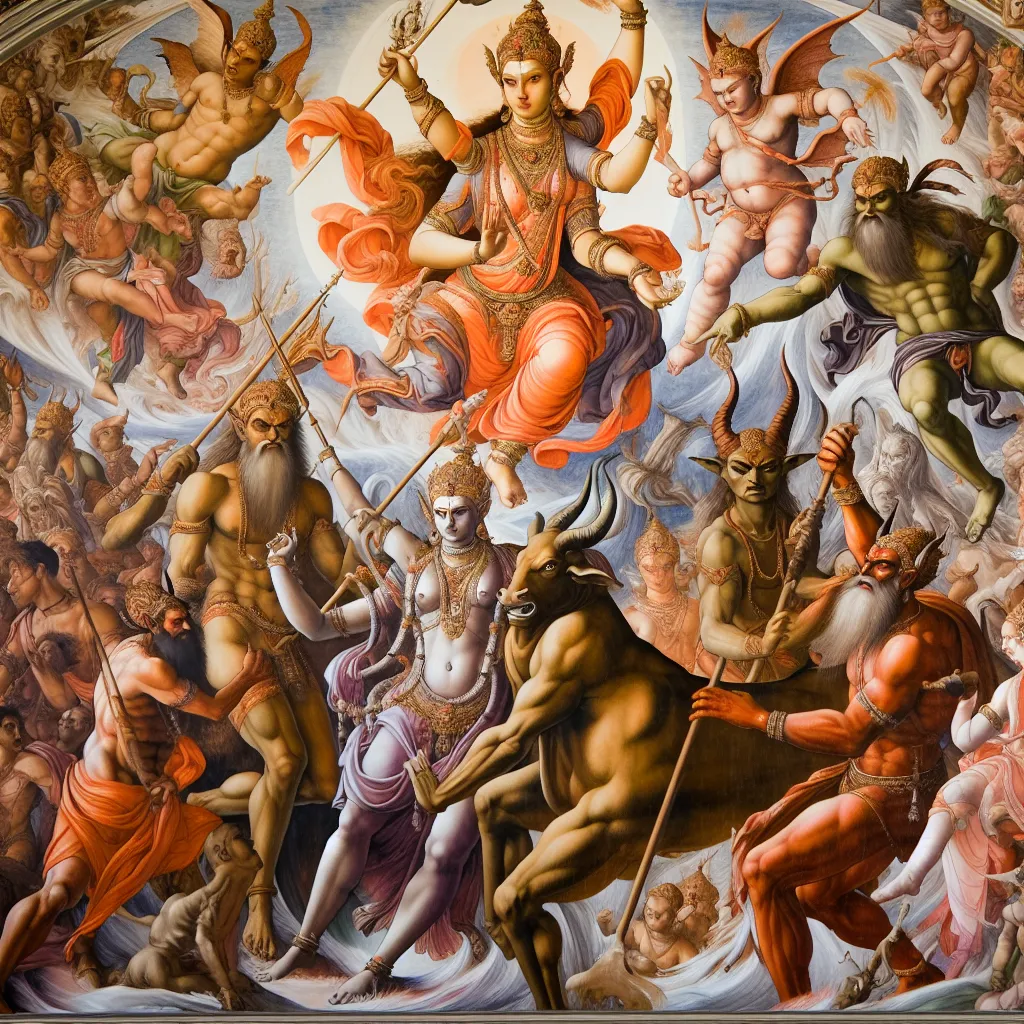
- Published on
- Authors

- Name
- You
Hindu Mythology and Its Spiritual Lessons: Stories of Gods, Demons, and Heroes
Hindu mythology is a vibrant tapestry woven with stories of gods, demons, and heroes, each holding profound spiritual lessons. This article delves into these ancient narratives, blending mystical wisdom with insights inspired by advanced science.
Table of Contents
- [Introduction](#i ntroduction)
- [The Divine Triad: Brahma, Vishnu, and Shiva](#t he-divine-triad-brahma-vishnu-and-shiva)
- [The Epic Tales: Ramayana and Mahabharata](#t he-epic-tales-ramayana-and-mahabharata)
- [Lessons in Ethics and Morality](#l essons-in-ethics-and-morality)
- [Divine Play: The Concept of Lila](#d ivine-play-the-concept-of-lila)
- [Modern Interpretations and Scientific Insights](#m odern-interpretations-and-scientific-insights)
- [Conclusion](#c onclusion)
Introduction
Hindu mythology is not just a collection of fanciful tales; it is a profound reservoir of spiritual knowledge and life lessons. These myths are timeless, encoding ethics, morality, and the intricate dance of the divine. By examining these stories, we can uncover deep philosophical teachings that resonate even in today's scientifically advanced world.
The Divine Triad: Brahma, Vishnu, and Shiva
Brahma: The Creator
Brahma, the four-headed god, symbolizes the principle of creation.
- Heads Represent: The four Vedas (Rig, Yajur, Sama, Atharva)
- Lesson: The omnipresence of knowledge and wisdom at the root of creation.
Vishnu: The Preserver
Vishnu, often depicted resting on the serpent Shesha, exemplifies preservation and sustenance.
- Avatars: Rama, Krishna, Narasimha, and others.
- Lesson: The importance of balance and protection in the universe.
Shiva: The Destroyer
Shiva, with his trident and third eye, represents destruction and transformation.
- Iconography: Nataraja (Lord of the Dance)
- Lesson: Destruction is a form of renewal, necessary for the cyclical nature of existence.
| God | Role | Symbolism |
|---|---|---|
| Brahma | Creator | Knowledge and beginnings |
| Vishnu | Preserver | Balance, sustenance, and protection |
| Shiva | Destroyer | Transformation, renewal, and the cyclical nature of the universe |
The Epic Tales: Ramayana and Mahabharata
Ramayana: The Perfect Ideal
The Ramayana narrates the life of Prince Rama and the struggles to rescue his wife, Sita, from the demon king Ravana.
- Characters: Rama (Virtue), Sita (Purity), Ravana (Ego).
- Lesson: The triumph of dharma (righteousness) over adharma (unrighteousness).
Mahabharata: The Cosmic Drama
The Mahabharata is a complex tale of the Kurukshetra War and the moral dilemmas faced by its key players.
- Character Arjuna: Tasked with fighting his kin.
- Bhagavad Gita: Krishna's counsel to Arjuna on duty and righteousness.
- Lesson: Inner battles and the pursuit of one's duty (svadharma) in the face of adversity.
Lessons in Ethics and Morality
The Concept of Dharma
- Dharma: Ethical duty and moral righteousness.
- Application: Finding one's purpose and acting in harmony with the universe.
Karma: The Law of Action
- Karma: The principle of cause and effect.
- Lesson: Every action has consequences; hence, mindful actions lead to a harmonious life.
Divine Play: The Concept of Lila
Lila, the divine play, explains the inexplicable nature of the universe.
- Lila: The universe as a playground for the divine.
- Lesson: Embracing life's unpredictability with a sense of playfulness and acceptance.
Modern Interpretations and Scientific Insights
Quantum Physics and Hindu Cosmology
- Wave-Particle Duality: Mirrors the flexibility of Hindu deities' forms.
- Multiverse Theory: Comparable to the multiple realms in Hindu mythology.
Consciousness and Meditation
- Neuroscience: Reveals benefits of meditation, aligning with ancient Hindu practices.
- Research: Studies show enhanced brain function and reduced stress from regular meditation.
Conclusion
Hindu mythology, with its rich tapestry of stories and characters, offers timeless spiritual lessons on ethics, morality, and the divine play. By appreciating these ancient narratives, we can find inspiration and guidance for leading a harmonious life, blending mystical wisdom with the advances of modern science.
May we all learn to balance our roles, duties, and the playful nature of existence, just as the gods, demons, and heroes of Hindu mythology have shown us.
